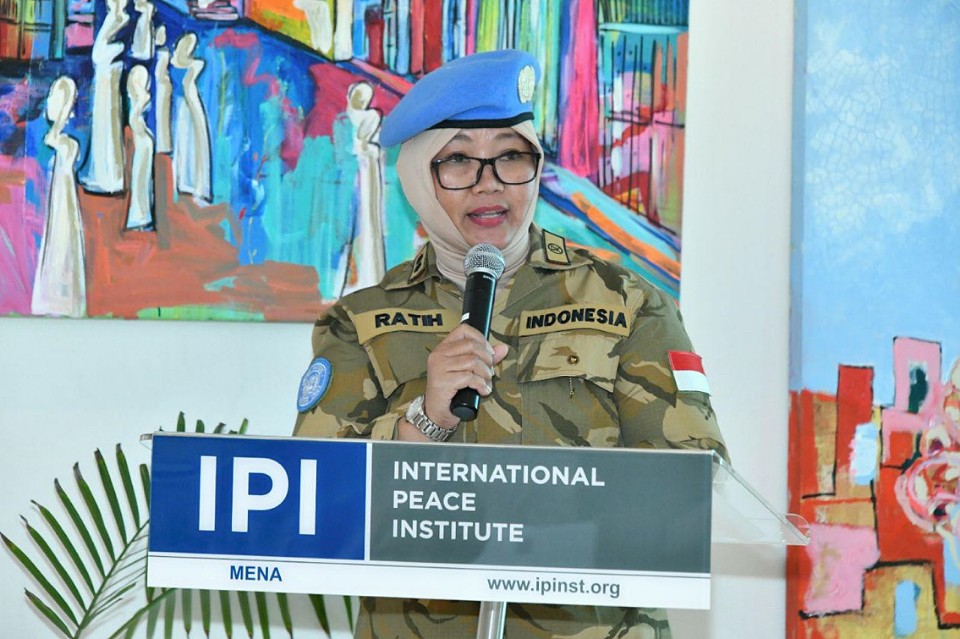Take Five: Women peacekeepers are role models for women and girls in the local community
Date:
Author: Radhiska Anggiana.

Lt. Colonel Ratih Pusparini is one of the first Indonesian women to have been dispatched in a peacekeeping mission. From 2008–2013, she served as a military observer and in various positions on UN peacekeeping missions in the Congo, Lebanon and Syria. In 2017, she spoke at the session of the UN Special Committee for Peacekeeping Operations (C-34) to highlight women’s roles in peacekeeping. In this interview, Lt. Colonel Pusparini shares what it means to have more women peacekeepers, and how to increase women’s participation in peacekeeping missions.
What first inspired you to be a UN peacekeeper?
In 2003, a circular from the United Nations was released, encouraging women in the Indonesian National Military (TNI) to participate in a peacekeeping mission. It was not until 2007 that they decided to deploy women in peacekeeping operations, and I was one of two women selected as UN peacekeepers.
I may not have realized it then, but I enjoyed being on a mission. I always wanted to do something more, and as a peacekeeper, I was able to contribute and make a positive impact on local communities. I realized this is my call, this is what I am looking for.
Why is it important to have more women peacekeepers?
Women play a vital role in peacekeeping operations, especially when it comes to reaching out and gaining trust from local communities. Our presence offers security to women and girls, particularly to victims of sexual violence, domestic violence and bullying. Because we have a greater awareness of women’s needs and vulnerabilities, women in these communities feel more comfortable speaking out and sharing their stories with us. We are able to respond with empathy and compassion, and from there we can gather critical information that is difficult to come by.
In conflict situations, women are often forced to become the sole heads of their households. However, our presence as peacekeepers sets an empowering example to women in these communities. In these times, women have a tremendous potential as agents of peace and in ensuring families’ survival and resilience.
Women peacekeepers are role models for women and girls in the local community. At one point in my mission in the Congo, a girl came to me and said she wanted to be like me. She said she wanted to be in the military so she can protect and secure peace in her country.
What are some of the challenges you see for women peacekeepers?
The biggest challenge is getting consent from families and spouses. Before deployment, women need to provide written permission from their spouse, or from their family if they are not married.
The other challenge is institutional. Women are still not given enough opportunities to participate in such missions and it largely depends on the decision maker in that institution. If decision makers do not push for better representation for women, it will be difficult to expand women’s roles in peacekeeping efforts. To have more women at the top level will also affect decision-making that supports women’s participation.
Traditional cultural values that limit women’s opportunities are also a challenge. In Indonesia, there is gender segregation in military occupational roles, restricting women’s choices. The military is still too dismissive of women being deployed on the front line. Women are mostly assigned to supporting units, administrative positions or medical personnel.
What can be done to have more women in peacekeeping missions?
We need to have a network consisting of policy makers who ensure that gender perspectives are understood across divisions of operations. This network should be able to voice the importance of having more women participate in peacekeeping missions.
When women are deployed in the field, their roles should go beyond areas perceived as “feminine duties” such as administration, medicine and logistics. Women should be placed in diverse roles. They should not be exclusive to men.
We also need adequate resources, especially in training. This means having more women who are mentally and physically prepared, able to work independently and with good English-speaking skills.
What is your advice for the next generation of Indonesian women peacekeepers?
Don’t be scared to challenge yourself. Don’t be scared to grab at opportunities outside your comfort zone. You need to grab at the chance; there are no second chances.
Remember that by doing this, you pave the way for your juniors. If people see how women in the Indonesian military have the right skills and potential, it will give more opportunities to the new generation of women to join peacekeeping missions. As a peacekeeper, you are representing Indonesia, so you need to do it to the best of your abilities.